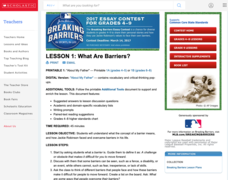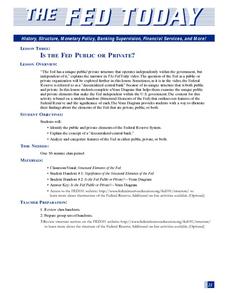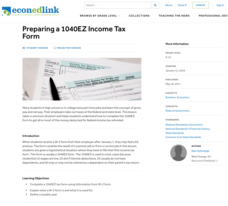Curated OER
US City Quality of Life Analysis and Comparison
Students analyze US census data and criteria to compare and measure the quality of life in the country's fifty largest cities. After accessing the 2005 quality of life world report online, students conduct their study to compare three...
School Improvement in Maryland
Supreme Court Case Overview I
As part of a study of the 14th Amendment to the United States Constitution, class members examine four Supreme Court decisions—Gitlow v. New York, Mapp v. Ohio, Gideon v. Wainwright, and Griswold v. Connecticut—that incorporated the due...
Curated OER
American History Through the Len of the Supreme Court Decisions
Students examine the historical background of Supreme Court decisions and the basic principles behind legislation. As part of the lesson, students discover legal concepts and terms and write sentences using the vocabulary they have...
Council for Economic Education
Green Eggs and ...Economics?
Scholars use four different children's books by Dr. Seuss to analyze microeconomic concepts. Group presentations and research help them better understand simple economic concepts through simple stories.
State Bar of Texas
Mapp v. Ohio
Do you have a search warrant? Scholars investigate the concept of illegal search and seizure through the eyes of the Supreme Court case Mapp v. Ohio. A short video clip along with paired group work opens discussion on the concept of how...
Scholastic
Lesson 1: What Are Barriers?
Scholars discuss the concept of a barrier with a short passage on Jackie Robinson. The writing process begins with a paragraph and several other sentences about Robinson's unique traits that made breaking a barrier possible.
Curated OER
This House is Made of Mud: Exploring the Shapes in Our Lives
Students study about our dependence on the earth's resources for materials. They practice their knowledge of geometric shapes by recognizing them in the context of the story.
Curated OER
A Sign of Their Times
Students identify the social climate that created the terms Degenerative Art and Fascist Aesthetic. They also identify how and why certain artists' artwork fell into these categories. Students recognize and discuss the Expressionist...
Curated OER
Transparency: Accountability
Students study the concept of "Question Time" as it relates to the ministers and the federal Parliament. In this accountability lesson, students investigate accountability in the federal Parliament. Students role-play to arrive at issues...
iCivics
Limiting Government
While this instructional activity includes several nice worksheets to identify and discuss the various limits on government (i.e. a constitution, the rule of law, separation of powers, consent of the governed, etc.), its main value lies...
Center for Civic Education
The Power of Nonviolence: Change Through Strategic Nonviolent Action
How did major historical figures, such as Henry David Thoreau, Susan B. Anthony, and Mohandas K. Gandhi, explain and defend their beliefs in nonviolence? Your learners will begin by studying the backgrounds of these individuals, and then...
Curated OER
Happy Birthday, Martin Luther King, Jr.
Primary learners will embrace diversity and celebrate multiculturalism through these engaging activities. Which include reading the story Martin Luther King and singing the song "A Man Named King." They will also explore the concept of...
Levin Institute
Unit on Culture and Globalization
Students explore the concept of cultural globalization. In this global issues lesson plan, students read and discuss the linked Web articles about world cultural issues and the dominance of the American market.
Odyssey of the Mind
Odyssey of the Mind Curriculum Activity: Balance the Books
There is a difference between profit and revenue, and it's up to your class to find out why. They each research the public accounting documents for their favorite company or brand. Then they use their findings to discuss the differences...
Federal Reserve Bank
Is the Fed Public or Private?
The Federal Reserve System as a decentralized central bank can be a difficult concept for learners to grasp. Help them get a firm handle on this concept using this resource, in which class members work as a group to identify the...
Federal Reserve Bank
Banking on Debit Cards
What are the advantages and disadvantages of using a credit card versus a debit card? What are the costs of using a debit card irresponsibly? Here you'll find a lesson on key concepts that every learner should know regarding personal...
Curated OER
Lost Names: Scenes From a Korean Boyhood,
What a great resource to share! Based on the book Lost Names by Richard Kim, this valuable lesson focuses on the Japanese occupation of Korea during WWII. Additionally, it employs first-person journaling as a mode of understanding themes...
Curated OER
Creating a North Carolina Gallery
Eighth graders, in teams, create a new North Carolina Gallery at the North Carolina Museum of Art. They explore the concept of citizenship by creating criteria for an artist's inclusion in the gallery.
Curated OER
Multicultural Music: Israel
Do a grapevine to the left, lift your hands in the air, and sing out, "Hey!" These are the steps second graders will do when they sing and dance the Israeli folk song, "Achshav.” They will explore the concept of multicultural music and...
Curated OER
Genocides of the 20th Century
Ninth graders research the causes of the major genocides of the 20th century. They participate in a jigsaw activity and complete a concept map of different genocides, watch and discuss excerpts from the movies "Hotel Rwanda," "The...
Council for Economic Education
Preparing a 1040EZ Income Tax Form
Some of us never feel like we know how to do our taxes! Help scholars understand the process early by using an informative resource. They fill out their own tax forms in a simulation activity and view multiple resources to learn even...
Council for Economic Education
Sand Art Brownies
Which is better, Coke or Pepsi? Pupils analyze the concept of substitute goods as they investigate the choice to purchase alternate products for better prices. Fun and practical, the engaging shopping exercise helps savvy scholars get...
Federal Reserve Bank
Monster Musical Chairs and Scarcity
Why can't we have everything we want? Youngsters are introduced to the concept of scarcity through a game of musical chairs and by discussing what it takes to satisfy our wants.
Indian Land Tenure Foundation
Sharing Resources: The Nuts Game
The land has always provided its inhabitants with resources that allow them to survive. However, sometimes resources run scarce and sharing becomes an important task. Help little ones understand why and how people have shared resources...

























